
Willie Hugh Nelson is an American singer, songwriter, guitarist, activist, and actor. He was one of the main figures of the progressive and outlaw country subgenres that developed in the late 1960s as a reaction to the conservative restrictions of the Nashville sound. The critical success of his album Shotgun Willie (1973), combined with the critical and commercial success of Red Headed Stranger (1975) and Stardust (1978), made Nelson one of the most recognized artists in country music. Nelson has acted in over 30 films, co-authored several books, and has been involved in activism for the use of biofuels and the legalization of marijuana.

Red Headed Stranger is the eighteenth studio album by American outlaw country singer Willie Nelson, released in 1975. Following the success of his recordings with Atlantic Records, coupled with the negotiating skills of his manager, Neil Reshen, Nelson signed a contract with Columbia Records, the label that gave him total creative control over his works. The concept for the album was inspired by the "Tale of the Red Headed Stranger", a song that Nelson used to play as a disc jockey on his program in Fort Worth, Texas. After signing with Columbia, he decided to record the song, and arranged the details during his return to Austin, Texas, from a trip to Colorado. It was recorded at low cost at Autumn Sound Studios in Garland, Texas. The songs featured sparse arrangements, largely limited to Nelson's guitar, piano, and drums. Nelson presented the finished material to Columbia executives, who were dubious about releasing an album that they at first thought was a demo. However, Nelson had creative control, so no further production was added.
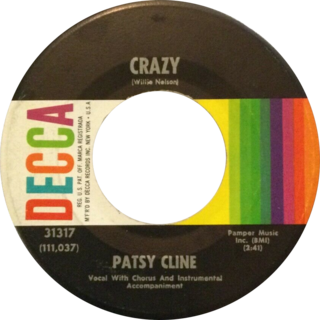
"Crazy" is a song written by Willie Nelson and popularized by country singer Patsy Cline in 1961. Nelson wrote the song while living in Houston, working for Pappy Daily's label D Records. He was also a radio DJ and performed in clubs. Nelson then moved to Nashville, Tennessee, working as a writer for Pamper Music. Through Hank Cochran, the song reached Patsy Cline. After her original recording and release, Cline's version reached number two on Billboard's Hot Country Singles, also crossing to the pop chart as a top 10 single.

Stardust is the 22nd studio album by Willie Nelson, released in April 1978. Its ten songs consist entirely of pop standards that Nelson picked from among his favorites. Nelson asked Booker T. Jones, who was his neighbor in Malibu at the time, to arrange a version of "Moonlight in Vermont". Impressed with Jones's work, Nelson asked him to produce the entire album. Nelson's decision to record such well-known tracks was controversial among Columbia executives because he had distinguished himself in the outlaw country genre. Recording of the album took only ten days.
"On the Road Again" is a song written and recorded by American country music singer Willie Nelson.

The Troublemaker is the 20th studio album by country singer and songwriter Willie Nelson. When Nelson refused to sign an early extension of his contract with RCA in 1972, the label decided not to release any further recordings. Nelson hired Neil Reshen as his manager, and while Reshen negotiated with RCA, Nelson moved to Austin, Texas, where the ongoing hippie music scene at the Armadillo World Headquarters renewed his musical style. In Nashville, Nelson met producer Jerry Wexler, vice president of Atlantic Records, who was interested in his music. Reshen solved the problems with RCA and signed Nelson with Atlantic Records as their first country music artist.

Yesterday's Wine is the 13th studio album and a concept album by country singer Willie Nelson. Nelson had been recording for RCA Victor since the early 1960s, and had released no significant hit records. By 1970, his recordings had reached mid-chart positions. Nelson lost the money he made from his song-writing royalties by financing concert tours that were generally unsuccessful and unprofitable. In addition to problems with his music career, Nelson had a troubled personal life. He had divorced his wife, Shirley Collie, and his Tennessee ranch had been destroyed by a fire.
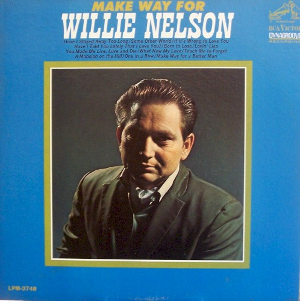
Make Way for Willie Nelson is the fifth studio album by country singer Willie Nelson.

...And Then I Wrote is the debut studio album by country singer Willie Nelson, recorded during August and September 1962 and released through Liberty Records.

"Bloody Mary Morning" is a song written and recorded by American country music singer Willie Nelson. Nelson wrote the song inspired by his struggles to become a "better parent". It was originally released in the 1970 RCA Records release Both Sides Now with the title "Bloody Merry Morning".
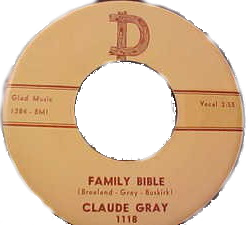
"Family Bible" is a song written by country music singer-songwriter Willie Nelson. Nelson began writing the song in 1957, while he enjoyed success as a disc jockey in KVAN, in Vancouver, Washington. After being denied a raise by the station, he moved to Houston, Texas. Due to financial issues he sold the song to Paul Buskirk.
"The Storm Has Just Begun" is a song by country music singer-songwriter Willie Nelson. Nelson wrote the song at the age of twelve. While working for KBOP in Pleasanton, Texas, in 1955, the song was one of the first two ever recorded by Nelson.

"Willingly" is a duet by American country music singer Willie Nelson and Shirley Collie, produced by Joe Allison during Nelson's third session for Liberty Records. Released in March 1962, the album reached number ten on Billboard's Hot Country Singles.
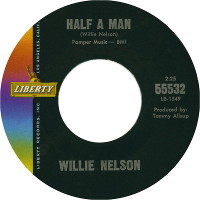
"Half a Man" is a song written and recorded by American country music singer Willie Nelson. The song was released as the A-side of the single for his second Liberty Records album, Here's Willie Nelson. Despite receiving mixed airplay for its content, the song became a sales success, peaking at number twenty-five on Billboard's Hot Country Singles and number twenty on Cashbox's country singles.

"Touch Me" is a song written and recorded by American country music singer Willie Nelson. Leveraged by the success of his songs, Nelson moved to Nashville in 1960. Through songwriter Harlan Howard, Nelson was signed to write for Pamper Music, and to a recording contract with Liberty Records.

"The Party's Over" is a song written and recorded by American country music singer Willie Nelson during the mid-1950s. After arriving in Houston, Texas, Nelson was hired to play for the Esquire Ballroom band, where he would be allowed to close the shows singing the song. Guitar instructor and Nelson's friend Paul Buskirk forwarded the song to singer Claude Gray, who recorded the original version of the song, released as "My Party's Over" in 1959.

"Pretty Paper" is a song written by country music singer-songwriter Willie Nelson in 1963. After being signed to Monument Records, Nelson played the song for producer Fred Foster. Foster pitched the song to Roy Orbison, who turned it into a hit. Nelson later recorded his own version of the song in November 1964.

"I Never Cared For You" is a song written by country music singer Willie Nelson. Nelson recorded the song during his stint with Monument Records, and eventually became his only single released by the label.
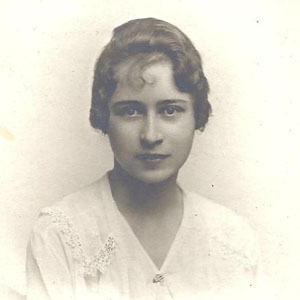
Edith Lindeman, also known as Edith Elliott Lindeman Calisch, was the film and theater critic for the Richmond Times-Dispatch from 1933 to 1964. She is best remembered for writing lyrics to popular songs, in collaboration with composer and Richmond radio announcer Carl Stutz.

"Blackjack County Chain" is a song written by Red Lane. The song was initially rejected by Charley Pride, who considered at the time the lyrics controversial.



















